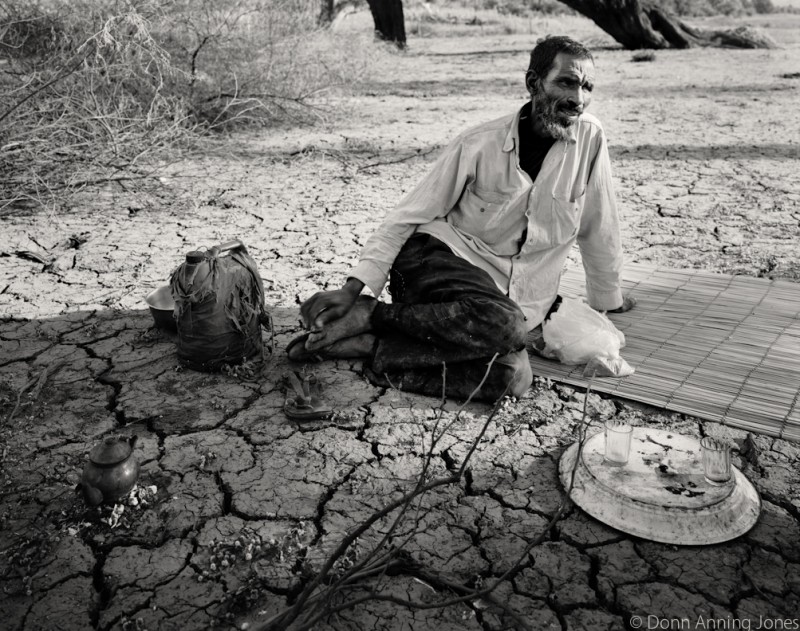An 8X10 Camera in Mauritania: Donn Jones
One of the best aspects of living in North Africa were the opportunities I had to travel into the baadia, The baadia is the countryside, it means “bush” or “village” and has both positive and negative connotations of tradition and simplicity. It can imply gentleness and hospitality as well as ignorance and backwoods thinking. It is where almost all Mauritanians come from (as the capital was only established in 1960) and it is where those in the city long to go each spring (note; Spring in the Sahara Desert is a relative term). During the “season of grass,” the goats gain some weight, give birth, and produce milk. The Moorish dream is to recline under a date palm and drink milk among friends and family. It has been the Saharan “happy-hour” for millennia.
Though I don’t have the same affinity that my Mauritanian friends do for camel or goat’s milk, I did find that one of the most effective ante-dotes to the stress of living in a place that is about as opposite to my SoCal upbringing as possible, was to travel into the interior. Desert camping in North Africa is the closest thing to time-travel we have and it gives you a profound glimpse into basic humanity. The earth is open and un-owned and the business of living is what life is all about. In the desert you follow whatever road, path, or compass you may be using and stop when the afternoon heat breaks. You stop when & where you want to. Invariably, after you set up your tent, a wizened old shepherd will wander by with his draa cinched around his waist and a stick slung over his shoulders, holding up his wrists, to check you out and see if you have anything you’re not using. As a courtesy, you ask if it is ok to stop here for the night and the reply is usually something to the effect that “the place belongs to God so you are welcome.”
On one such trip my party came across Mohammed Ould Rahed. sitting in a dry, caked river bank next to what was still flowing of the river. We were in N’beka, Mauritania, a few hundred kilometers from the capital, and Mohammed had eked out a small garden near the only water source for miles. He was guarding his garden from animals that would very much see it as an opportune food source. Spending the day in what shade there was, fanning charcoal with his shoe, making mint tea, Mohammed invited us to sit down and join him. As we talked, I asked if he’d mind if I made a photograph of him. Most adult Mauritanians will decline being photographed as the prevalent view is that being in a photograph is shameful – a friend told me once that you photograph animals & objects, not people–, some will allow it out of politeness but almost none will enjoy the process. I was traveling with an 8×10 and as I set it up, I could see his perplexity growing. I made a couple of exposures and told him that I did not know when I’d be back but that someday I would bring him a print.
It was about three years later when I made it back to N’beka and I came with an 8×10 contact print protected in an otherwise empty Kodak box. We stopped in the town to get lunch and showing the photograph to a local man, we asked if Mohammed was around. “He died.” the man told us. “Yes, he was walking to another village and did not take enough water. He died in the desert.” My travel companions and I processed that news in silence as we ate lunch. I pondered Mohammed’s hard life; yes the basics of life– food, water, shelter –are much closer to the surface here than they are for many of earth’s industrialized inhabitants.
As we headed to our vehicles, a man approached us.
“Mohammed???”
“Salaam Alaikum.” he replied.
“You look great!” I said. (was it Mark Twain who said the reports of his death were greatly exaggerated?)
He told us that someone had told him some Americans were looking for him and he’d come to see who and he had recognized our cars. It is a common assumption in the Islamic Republic of Mauritania that most foreigners are CIA; I suspect that the man we approached was protecting Mohammed from us, throwing us off his trail and then alerting Mohammed to our presence. In any case, I was elated to give him the photograph and even happier that he wasn’t dead. He looked at the photograph with the same puzzled expression he’d exhibited when i set up my 8×10 in his garden. He would look at it and then close the box. He kept telling us that he was fine, it was good to see us, life was plodding along, etc. Every few minutes during the conversation he would open the box and study the photograph, close it up and continue talking.
I left Mauritania in 2007 but have a large print of Mohammed on my wall, still fanning the charcoal and guarding his garden. I am optimistic that I might meet up with him again someday. Until then, I hope he is enjoying his photograph as much as I am.
Donn Jones, Portland, Oregon
